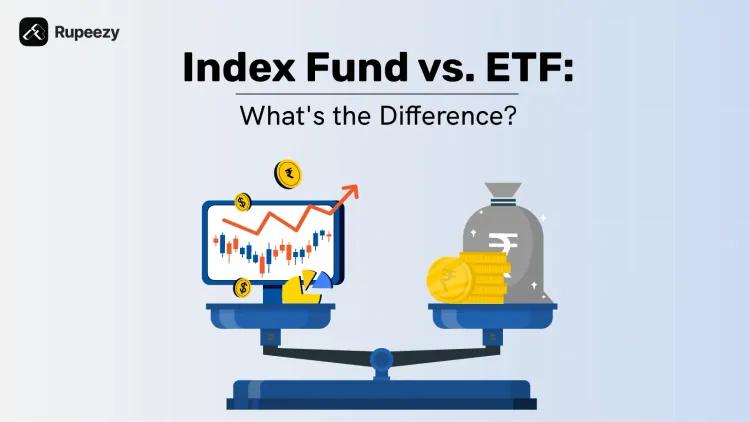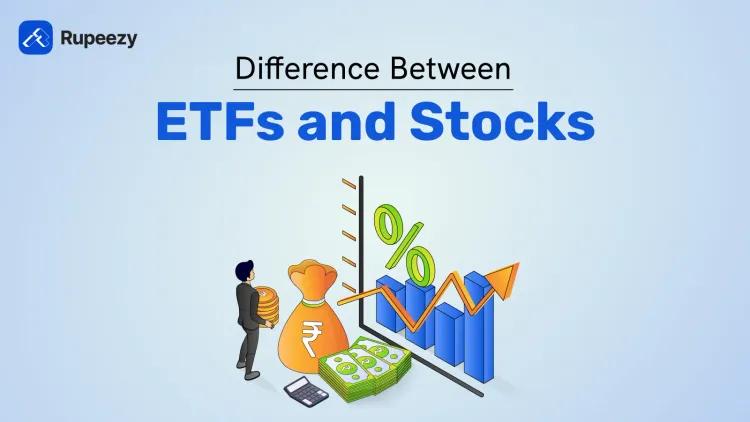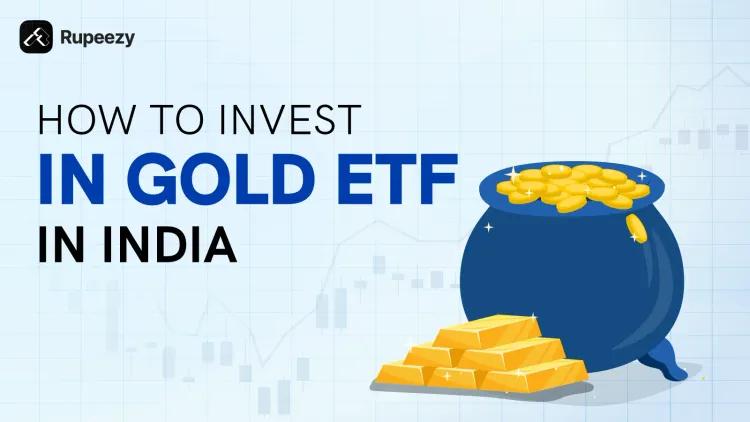ETF vs Mutual Fund - Which One is Better for You?


00:00 / 00:00
Do you feel intimidated by complex terms in the world of investing? In our blogs, we attempt to demystify these terms and make them palatable so that you do not miss any opportunity to invest in different types of investments. One such term is ETF or Exchange Traded Funds, which have recently gained popularity.
ETFs are similar to mutual funds with the difference that they can be traded like a stock on exchanges. In this article, let us compare ETF vs mutual funds and the best ones to include in your portfolio.
What is an ETF
An ETF is a fund comprising a pool of securities that can be traded as a unit on stock exchanges. It is a simple financial instrument suitable for retail investors. ETFs invest in underlying securities of a particular type, similar to what mutual funds do. There can be different types of ETFs, for example, gold ETF, Nifty ETF, Silver ETF, Bond ETF, Midcap or IT ETF etc.
ETFs, depending on objective, invest in an index and track the performance of a particular index. ETFs are not managed actively because they simply replicate the index or stock basket as per the defined objective. ETFs tend to have lower expense ratio compared to regular funds since there is no active management involved.
What is a Mutual Fund
A mutual fund is a pool of money collected from various investors and invests in particular types of stocks or securities on behalf of these investors. Mutual funds are not traded directly on exchanges but indirectly invest in capital markets. Mutual funds can be bought or sold according to the NAV declared for every business day.
A mutual fund can be broad-based or may be focussed on a particular sector or strategy. Mutual funds run by professionals are the simplest way to invest in capital markets and suit beginners as well as experienced investors.
Difference Between ETF and Mutual Fund
Mutual funds and ETFs have many similarities and differences, let us look at the key differences in the table below:
Factor | Mutual Fund | ETF |
Invests In | Stocks, fixed income instruments, commodities, indices | Usually broad indices or sector specific indices |
Investment Objective | Deliver above average returns and outperform relevant index/benchmark | Replicate index in same proportion and deliver index like returns with minimal deviation |
Management Style | Actively managed, fund manager’s expertise & skill is a factor | Passively managed, portfolio composition strictly as per underlying index |
Traded On | Not traded directly on stock exchanges | Traded directly on stock exchanges |
Cost & Fees | Varies depending on the type of fund. Generally higher than ETFs ranging from 1% - 2.25% | Lower expense ratio compared to mutual funds since ETFs are passively managed |
Variety | Large spectrum of funds, schemes, AMCs | Limited options in each category/AMC |
NAV/Price | Daily NAV based, NAV declared for each business day | Traded on exchanges as per prevailing dynamic market price during market hours |
Liquidity | Redeemed as per daily declared NAV at end of business day, no live trading | Live trading, bought, sold on exchange, higher liquidity compared to mutual funds |
Risk | Professionally managed, active management, risk can vary as per fund objective | Directly related to underlying indices, less risky compared to mutual funds |
Return | High return potential with fund manager strategies, experience | Return matched with underlying indices/asset’s return |
Mutual Fund vs ETF: Similarities
Factor | Mutual Fund | ETF |
Pooled corpus | Mutual funds collect funds from multiple investors to build corpus | ETFs are also pooled investments from a large number of investors |
Diversification | Mutual funds invest in a bouquet of stocks, and securities to mitigate risk and deliver returns from a wider choice of securities | Invests in diversified broad indices or sector-specific indices, for spreading risk and achieve index matched returns |
Choice of Funds | A variety of funds from various AMCs available for different risk profiles, return expectations, time horizon, goals. | A variety of ETFs available from various AMCs that track indices, sub indices, sectoral indices to choose from. |
Management | Professionally managed by a team of qualified experienced fund managers. | Professionally managed by qualified fund managers with a passive management style |
NAV based | Mutual fund NAV is calculated on the basis of value of underlying investment at the end of a market day | ETFs are also NAV based and the NAV is derived from the value of the underlying index. |
ETF vs Mutual Fund: Which is Better?
Both mutual funds and ETFs are viable investing tools for beginners and for investors who do not have the time, expertise, or inclination to invest directly in the capital markets. ETFs and mutual funds offer ease, flexibility, and convenience to investors in terms of professional fund management.
Mutual funds offer a better choice, variety, and a larger selection of funds to choose from in different asset classes. Mutual funds offer a higher return potential as fund managers aim to beat the benchmark and outperform the markets with sound, well-researched and active investment strategies throughout.
Mutual funds thus come with higher management fees and expense ratios. They are suitable when you expect a wider portfolio across sectors, market caps, indices for better returns, and no restriction in terms of choice of stocks. Investors with high risk appetite and long time horizons should take to mutual funds for a large part of their portfolio to mix and match different asset classes, sectors, and stocks.
ETFs strictly invest in indices and do not endavour to outperform the index, they simply match the returns and invest as per the composition of the underlying index. Investors looking for lower risk and lower expense avenues should look at passively managed ETFs with minimal variance from the index return or strategy.
ETFs are traded on exchanges like common stock, can be bought and sold anytime on a trading day, and have slightly better liquidity than mutual funds. Thus, investors looking for low risk, low expense and low engagement investments are the best candidates for ETFs.
ETF vs Mutual Fund Returns
ETFs and mutual funds are different products and a like-to-like comparison is not suitable but you can look at the returns of some of the top-performing mutual funds and ETFs.
Top Performing Mutual Funds
Fund Name | Category | Return (3Y) | Expense Ratio | AUM (Rs. Cr) |
Nippon India Large Cap Fund | Equity Large Cap | 19.46% | 0.67% | 34105 |
Edelweiss Mid Cap Fund | Equity Mid Cap Fund | 24.71% | 0.58% | 20056 |
SBI PSU Fund | Equity Sectoral Fund | 35.39% | 0.72% | 4471 |
Motilal Oswal Nifty Smallcap 250 Index Fund | Index Fund | 21.37% | 0.36% | 820 |
JM Aggressive Hybrid Fund | Aggressive Hybrid | 22.05% | 0.53% | 679 |
Kotak Debt Hybrid | Conservative Hybrid | 10.82% | 0.48% | 2999 |
UTI Medium to Long Duration | Debt - Medium to Long Term | 8.3% | 1.24% | 313 |
Bank of India Short Term Income Fund | Debt - Short Term | 11.21% | 0.45% | 72 |
Top Performing ETFs
Fund Name | Asset Size (Rs. Cr) | Return (1Y) | Return (3Y) |
CPSE ETF | 39988 | 65.77% | 44.93% |
Mirae Asset Nifty Next 50 ETF | 371.28 | 53.35% | 17.66% |
SBI ETF Nifty Next 50 | 2934.29 | 53.33% | 17.71% |
Nippon ETF Junior BeES | 5332.08 | 53.2% | 17.66% |
Nippon ETF Dividend Opportunities | 56.74 | 42.34% | 22.15% |
Motilal MOSt Oswal Midcap 100 ETF | 533.7 | 37.66% | 21.35% |
Motilal Oswal NASDAQ 100 ETF | 8299 | 37.38% | 14.4% |
ETF vs Mutual Fund: Tax Implications
Capital gains from mutual funds and ETFs both are liable for tax.
Type of Fund | Duration | STCG | Duration | LTCG |
Equity Mutual Funds | < 12 months | 20% | >12 months | 12.5% |
Debt Mutual Funds | Always short term | Income tax slab rate | Always short term | Income tax slab rate |
Equity oriented Hybrid Funds/ Arbitrage Funds | < 12 months | 20% | >12 months | 12.5% |
Debt oriented hybrid funds | Always short term | Income tax slab rate | Always short term | Income tax slab rate |
Gold mutual funds | <24 months | Income tax slab rate | >24 months | 12.5% |
Domestic Equity ETFs | < 12 months | 20% | >12 months | 12.5% |
International Equity ETFs (India listed) | < 12 months | Income tax slab rate | >12 months | 12.5% |
International Equity ETFs (listed outside India) | <24 months | Income tax slab rate | >24 months | 12.5% |
Domestic Debt ETFs | Always short term | Income tax slab rate | Always short term | Income tax slab rate |
Gold ETFs | < 12 months | Income tax slab rate | >12 months | 12.5% |
The long-term capital gains tax rate applicable on equity/equity-oriented mutual funds/ETFs is 12.5% on gains exceeding Rs. 1,25,000. Gains up to Rs. 1,25,000 are exempt from tax.
Mutual Funds vs ETFs: Pros and Cons
To weigh the pros and cons of ETFs vs mutual funds, your investment objectives and financial goals must be the key factor.
If you prefer a passively managed investment with a buy-and-hold strategy without much intervention from you or fund manager, an ETF is a suitable option.
If you want an aggressive investing style where the fund manager picks the best bet and tries to outperform the markets or sectors, mutual funds offer many choices for every investing style.
If you prefer to invest in segments that are undervalued but demonstrate great future potential, mutual funds are the best option where the fund manager conducts research to determine the best instrument to benefit from market and stock valuations.
If cost is a concern, ETFs are best bet with low expense ratios as against mutual funds with higher management fees.
If you want better liquidity and ability to trade frequently, you can go with ETFs. Mutual funds on the other hand provide a long term, consistent investment strategy through SIPs without the need for frequent trading and monitoring.
Conclusion
To conclude, both ETFs and mutual funds are excellent tools for retail investors to channel their savings in stock markets and generate long term wealth. Both instruments pool funds from investors, offer the benefit of diversification, are managed professionally, and are under SEBI’s purview. While mutual funds have a larger canvas, ETFs are passively managed and track a particular index or basket of stocks. Thus, ETFs are more cost efficient but offer limited choice.
You can include mutual funds to beat the benchmarks and ETFs to gain from long term growth in broad indices as the economy flourishes. ETFs or mutual funds, your choice can be any, Rupeezy offers you a wide range of mutual funds from 40+ AMCs and the best ETFs listed on NSE. Open an online account today and explore ETFs, stocks, mutual funds, IPOs, derivatives, commodities and more.
FAQs
Q. Is ETF better than a mutual fund?
ETFs track an index and do not require active management, thus the expense ratio for ETFs is low. Whereas mutual funds offer a wider choice in stocks, sectors, and commodities, they are actively managed and aim to outperform indices.
Q. Are ETFs risky?
ETFs simply track an underlying index therefore when markets fall, ETFs run the risk of downturn in proportion to index losses. Samr way, ETFs benefit when markets generally perform well over the long term.
Q. Can I sell ETFs anytime?
ETFs are traded in real time on exchanges and you can sell them during market hours at prevailing prices.
Q. How can I buy an ETF?
You need to have an active demat and trading account with a SEBI-registered broker to buy or sell ETFs. They are traded like common stocks and can be bought and sold during market hours.
Check Out These Related Articles |
The content on this blog is for educational purposes only and should not be considered investment advice. While we strive for accuracy, some information may contain errors or delays in updates.
Mentions of stocks or investment products are solely for informational purposes and do not constitute recommendations. Investors should conduct their own research before making any decisions.
Investing in financial markets are subject to market risks, and past performance does not guarantee future results. It is advisable to consult a qualified financial professional, review official documents, and verify information independently before making investment decisions.

All Category










